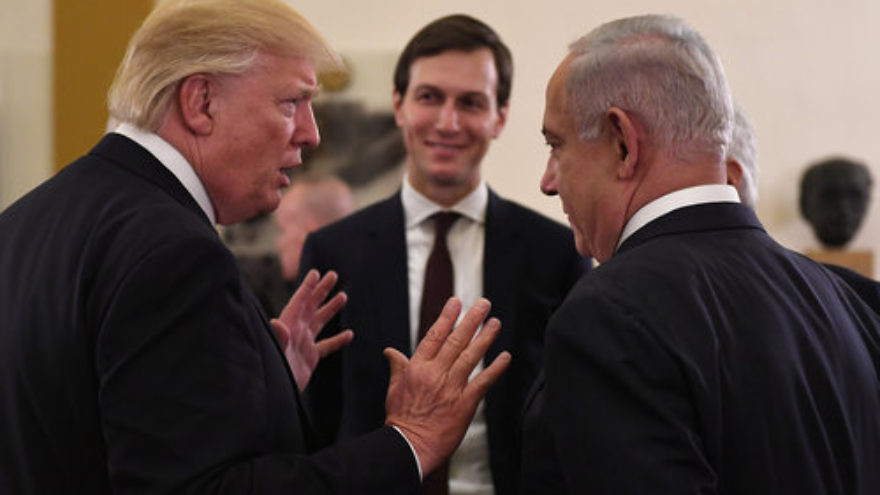When Israeli Prime Minister Benjamin Netanyahu announced Israel’s return to the election drawing board, it sent political shockwaves throughout the country. It also proved shocking for the Trump administration since the government coalition failure comes just as it launches robust efforts to implement the first part of its long-touted Mideast peace plan. The Bahrain “Peace to Prosperity” summit, which will see Americans, Israelis and the Arab League come together, is meant to act as the launching pad for a proposal arranged by White House senior adviser Jared Kushner and U.S. special envoy to the Middle East Jason Greenblatt to resolve the Arab-Israeli conflict once and for all.
The stumbling block by the Israeli government temporarily threw the summit into question, but with so much at stake in the Middle East, the Trump administration is moving forward with its efforts to launch “Phase 1.” Come hell or high water (or yet another Israeli election), the White House is focused on its goal of resolving the age-old conflict. But can progress be made?
Others, however, are more hopeful, and have clarified that, if nothing else, what has been touted as a new approach to the conflict may at least change the paradigm of thinking for the future. According to David Weinberg, vice president of the Jerusalem Institute for Strategic Studies, the Trump administration “is reversing a long-deleterious global dynamic regarding Israel and the Palestinians, thus transforming the Mideast diplomatic playing field.”
Recent events, such as Netanyahu’s visit to Oman and now this conference, demonstrate a clear departure from the decades-long commitment by Muslim nations to normalize relations with Israel only after its resolution with the Palestinians. Now, the winds are blowing in a new direction. The Persian Gulf states are trying to push the Palestinians since they believe the Palestinians are an obstacle to the regional alliance against Iran.
The conference, which will focus on the main economic issues facing the Palestinians, include infrastructure, industry, empowering citizens and governance reforms. This stage is expected to be followed with the Trump administration’s “Phase 2” diplomatic aspect of the peace plan. And if “Phase 1” is tricky to achieve, “Phase 2” will likely be even trickier.
‘A battle for the hearts and minds of Palestinians’
Eytan Gilboa, professor of international relations and international communication, and a senior research associate at the Begin-Sadat Center for Strategic Studies at Bar-Ilan University in Ramat Gan, told JNS that the Trump administration is dealing with a new momentum, which, starting with the summit in Bahrain, must be kept in motion.
“This is a battle for the hearts and minds of the Palestinians,” Gilboa said about the summit.
“The central point,” he said, “is how to create pressure from the Palestinian people on their own leadership. This will not be easy since they have been brainwashed by their leadership.”
Gilboa pointed out that the Palestinian leadership has shown many times that it doesn’t want a resolution. “They are not interested in peace agreements. They are not interested in economic benefits,” he added.
The question, according to Gilboa, is how to use economic benefits to change the main course of action that has dominated the Palestinian approach to negotiations. “The whole idea of the Trump administration is to break the hedge in two ways. One is between the Palestinian leadership and the people. The other is between the Palestinian leadership and the Arab world.”
For Gilboa, the basic assumption is that it will be “very difficult” for the Trump administration to go beyond the conference itself. To fully succeed, the second phase will need the momentum created by a successful first phase in Bahrain. The administration cannot afford too much time between the two phases.
The question is what comes next? If too much time passes, whatever successes emerge from Bahrain will lose momentum if the second phase of peacemaking cannot get off the ground. One of the conditions for the second phase to succeed is having a stable Israeli government in place.
So for Gilboa, the link between the first and second phases is weak since a lot could go wrong in between.
To ensure that the process keeps churning, the Trump administration appears to have taken steps to demonstrate to the Palestinians that if they dawdle, they will only stand to lose and will weaken their own negotiating stance.
Weinberg made this point when he said, “by asserting the law of diminishing returns (i.e., that Arabs who refuse to make peace with Israel lose rights and assets as time goes forward; see American recognition of Israel’s sovereignty in the Golan), the administration is telling the Palestinians: The aspects of sovereignty in some parts of Judea and Samaria that might be available now to the Palestinian Authority in a deal with Israel won’t necessarily be obtainable in several years’ time. Nor will the potential economic benefits.”
“Skip Bahrain if you want,” Weinberg warned the Palestinians, “but suffer the consequences.”
























